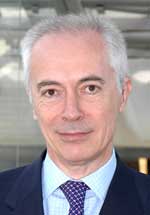
Word from the Sectretary General

Dear Members,
I hope that you have enjoyed (or are still enjoying) your summer break and are feeling rested, refreshed and raring to go. As you know, these are challenging times for the European nuclear research community and we will need all our energy, focus and enthusiasm to meet the challenges ahead.

|
A few weeks ago I was fortunate to have the opportunity to visit a historical site: the location of the EBR-1 nuclear reactor, the first ever nuclear reactor to produce electricity, back in 1951. At the reactor site visitors can observe a row of incandescent light bulbs. The light that was first emitted from those light bulbs testified to the success of that pioneering project. The EBR-1 was an operational fast neutron reactor, with a sodium-potassium coolant. Ten years later it demonstrated how plutonium can be used as a suitable nuclear fuel. The reactor’s core later experienced a partial meltdown - every scenario was tested, the lessons from every experience were learnt!
|
I couldn’t help making the connection between the EBR-1 and the experimental Solar Impulse aircraft, which will soon set off on its epic flight around the world. The power capacity of its two engines is rather limited and critics have been quick to ridicule the misplaced ambition and “dreams of glory” of the project’s promoters. And yet, in the space of fifty years nuclear energy succeeded in imposing itself as an essential energy source in a number of countries. Solar energy will doubtless overcome the doubters and play a similarly significant role over the next few decades.
In both cases, the teams of scientists and engineers that were involved in the EBR-1 and Solar Impulse projects (and in the latter case still are today) dared to go beyond the well-trodden paths and frontiers of accepted science and to explore new techniques that had never been dreamt of before. Both teams showed how they were driven and motivated by a similar passionate quest for progress, progress fuelled by discovery. By going beyond where anyone had been before they succeeded in changing the world.
As the debate about the merits and disadvantages of nuclear energy carries on unabated I am struck by the obscurantism of many opponents of nuclear energy. They seem to think that the world is static; that R&D is destined to bear no fruit and that technology and progress have gone their separate ways – never to be reunited. In actual fact, the opposite is true: science has never been so demonstrative of success and the relentless increase in the world’s population continues to present the scientific community with unprecedented challenges.
Of course, as the proverb goes, “science without conscience will destroy the soul.” Technological progress, therefore, requires us to make conscious societal choices that are the result of careful consideration, exhaustive discussion and, hopefully, consensus. ENS contributes to this vital process by mobilising the European nuclear community and engaging them in the on-going debate about the fundamental issues that the application of nuclear energy raises, especially with regards to medicine, industry, transport, the conquest of space etc. This culture of encouraging debate is essential. And it’s up to each and every one of us to play our part in it.
|

